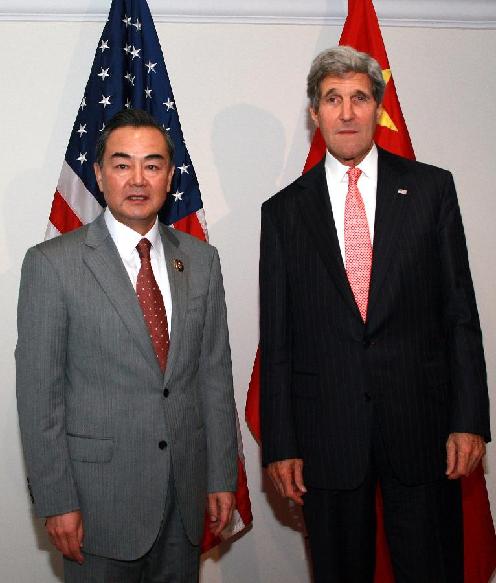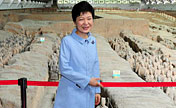


BANDAR SERI BEGAWAN, July 1 (Xinhua) -- Chinese Foreign Minister Wang Yi said here Monday that China and the United States should build a new type of great power relations in an active and comprehensive manner, after the historical summit between Chinese President Xi Jinping and U.S. President Barack Obama.
The two presidents have agreed to build a new type of great power relations between the two countries, turned on a new chapter for China-U.S. "trans-Pacific" cooperation and pointed out the direction for the bilateral ties in a new age during their recent summit at the Sunnylands estate in California, Wang said when he met with his U.S. counterpart John Kerry.
The two were in Brunei for dialogue meetings with their ASEAN counterparts and related foreign ministers' meeting.
Wang said both China and the United States should contribute to the global peace, stability and development by playing their part and embarking on comprehensive cooperation, which is the common responsibility that should be shouldered by the two countries together.
China and the United States should implement the consensus reached by the two presidents in an active and comprehensive manner, increase mutual trust, deepen cooperation and manage the differences appropriately, Wang said.
The two countries should keep the good momentum in bilateral relations after the meeting of their leaders.
Kerry said the U.S.-China bilateral relations could only go forward and the two countries can cooperate better on global issues.
On the situation on the Korean Peninsula, Wang emphasized that the denuclearization as well as safeguarding the peace and security on the peninsula remain the unswerving goals of China.
Wang urged stakeholders on the issue to work together for an early restart of the six-party talk, as some positive signs have emerged.
Kerry said China had played a helpful and constructive role on the issue and pledged to keep in touch with the Chinese side.
Wang also briefed his U.S. counterpart on China's position on the South China Sea and its relevant background information, which Wang said should not be an issue between China and the United States.
The United States should understand and respect the efforts made by China and other countries in maintaining regional peace and stability, Wang said. He also urged U.S. government to deal with sensitive issues related to China's Taiwan, Tibet, Xinjiang regions and other areas cautiously.
Earlier in the day, Wang met with Russian Foreign Minister Sergey Lavrov and the two agreed to strengthen consultations and cooperation on Asia-pacific affairs, safeguard common interest, promote peace and security as well as development and prosperity in the region.
 Officers and men in camouflage,survival training
Officers and men in camouflage,survival training Afghan army soldiers capture weapons
Afghan army soldiers capture weapons  ROK President visits terracotta army in Xi'an
ROK President visits terracotta army in Xi'an  Annual Gay Pride Parade held in Chicago
Annual Gay Pride Parade held in Chicago  Imposing scenery of Hukou Waterfall on Yellow River
Imposing scenery of Hukou Waterfall on Yellow River  China's weekly story
China's weekly story Blue-green algae expand at the Chaohu Lake
Blue-green algae expand at the Chaohu Lake China's summer railway travel rush starts
China's summer railway travel rush starts  Lotus flowers bloom in Shanghai
Lotus flowers bloom in Shanghai Spending weekends in Dongjiangwan
Spending weekends in Dongjiangwan The Art and artifacts in HD
The Art and artifacts in HD Those amazing sceneries in China
Those amazing sceneries in China And the next big thing? Try surfing in the air
And the next big thing? Try surfing in the air 2013 China wedding expo kicks off
2013 China wedding expo kicks off Long-historied Naimu Temple in China's Tibet
Long-historied Naimu Temple in China's Tibet